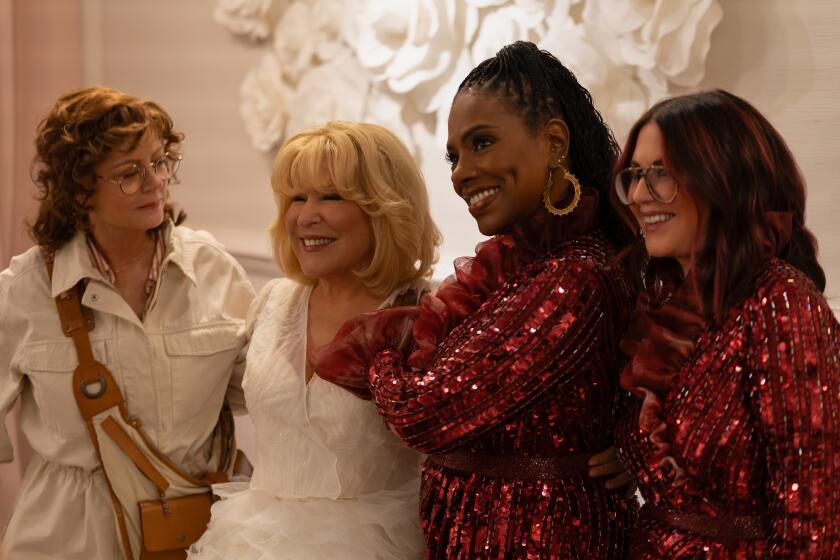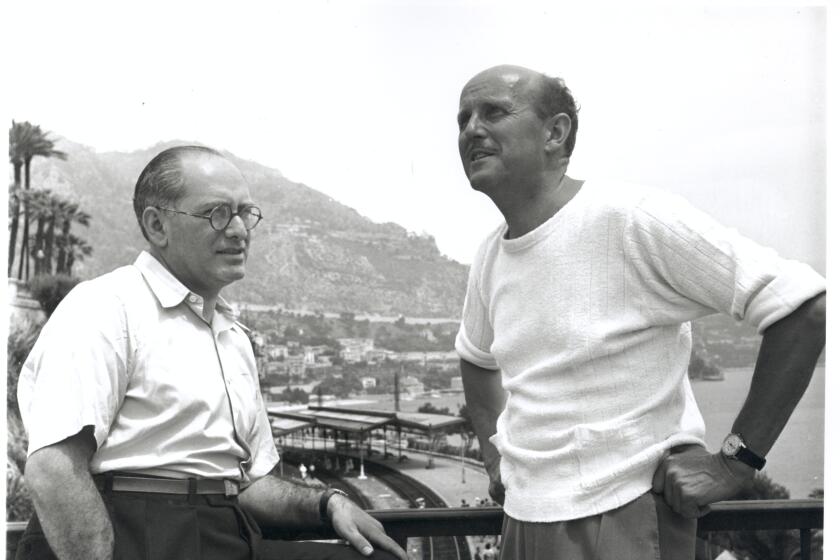Life of the Party? (Yes, as in Political)
“ . . . All the years I’ve wasted being a pretty girl and a smart ass.”
So says the title character in Alan Rudolph’s biographical film “Mrs. Parker and the Vicious Circle.” After two hours watching the drunken sparring of the Algonquin Round Table, viewers may well agree.
Yet while the film offers an intellectually titillating chronicle of life among 1920s New York writers and critics, viewers might think Dorothy Parker was no more than a witty, miserable alcoholic. In fact, Parker spent much of her career as a different kind of party girl.
Parker first awoke to politics at a 1927 Boston demonstration in support of convicted anarchists Nicola Sacco and Bartolomeo Vanzetti as they awaited the electric chair. Like many intellectuals of her generation--although not her fellow Algonquin knights--Parker was radicalized by what she perceived to be a grave miscarriage of justice.
That same year, Parker published “Arrangement in Black and White,” a witty and scathing portrait of a white society woman talking with a celebrated black singer “just as natural as I would with anybody.” The subject of race relations was a major concern of Parker’s until her death in 1967. In fact, she bequeathed her estate, including copyrights to her writing and poetry, to Martin Luther King Jr. The film’s final credits include this information, which, after the film’s focus on debauchery and heartbreak, seems an anomaly.
The film’s credits almost obscure another surprising piece of information. In an interview that serves as the film’s epilogue, Parker says that her participation in the Spanish Civil War was “the proudest thing I’ve ever been a part of.” Viewers at this point could be excused for dropping their popcorn buckets.
In fact, Parker’s 10-day tour of Spain in 1937 made her a staunch supporter of the Loyalist cause, as evidenced by subsequent actions and writing. As described by Marion Meade in her biography, “Dorothy Parker: What Fresh Hell Is This?,” soon after returning to New York, Parker agreed to be national chair of the North American Committee to Aid Spanish Democracy.
“I want with all my heart to do anything I can in the campaign to aid Spanish children,” she wrote at the time.
And in the short story “Soldiers of the Republic” (1937), Parker departs from her traditional sarcastic stance and writes a paean to the courage and the poverty of the Spanish people.
While seldom far from the bottle, Parker was repeatedly moved to activism by her zeal for justice. In Hollywood, she championed the cause of lesser-known writers who were underpaid and exploited by the major studios. And she disdained those reluctant to join the writers’ guild.
“(Parker) wanted to say, ‘Now, look, baby, union is spelled with five letters,’ ” Meade writes. “ ‘It is not a four-letter word.’ ” Rudolph includes a similar mumbled witticism in the film’s first scene, though with so little context that viewers still settling into their seats may not get the joke.
Her involvement with the nascent effort to unionize Hollywood writers soon led Parker to other political causes. In 1936, she helped form the Hollywood Anti-Nazi League. Eventually, her outspokenness, strident anti-fascism and flirtation with the Communist Party (though her membership was never proved) gained her the attention of the House Un-American Activities Committee. Parker never was subpoenaed, but she later said that she was blacklisted during the 1950s.
Parker’s luxurious Hollywood home and lavish life furnished an unlikely backdrop for left-wing political fund-raisers and speeches by radical trade unionists, an irony not lost on her friends, who were mystified by her radicalism.
Parker understood all too well the source of her friends’ conservatism. Many of the Round Table members depended on wealthy patrons to support their lifestyles. In stories like “Little Curtis” (1926) and “The Custard Heart” (1939), Parker satirized the brutality and thoughtlessness of “secure and leisured ladies” who were often her benefactors. And in “Clothe the Naked” (1937), for the first time, she adopted the perspective of the downtrodden. A poor, blind boy, wearing the grudging gift of a wealthy man’s cast-off clothes, walks down the street and into his neighbors’ envy: “great flails beating him flat, great prongs tearing his flesh from his bones.”
In “Mrs. Parker,” Rudolph fails to grapple with the apparent contradiction in his subject’s nature. The viewer’s only clue about Parker’s activism are a few elliptical snippets of dialogue.
As usual, however, Dorothy Parker has the last laugh. Her commitment to politics lives on in her work. Nearly 70 years after it was published, Parker’s verse applies equally well to her hunger for justice as to her thirst for drink:
But I, despite expert advice,
Keep doing things I think are nice,
And though to good I never come--
Inseparable my nose and thumb. *
More to Read
Only good movies
Get the Indie Focus newsletter, Mark Olsen's weekly guide to the world of cinema.
You may occasionally receive promotional content from the Los Angeles Times.






